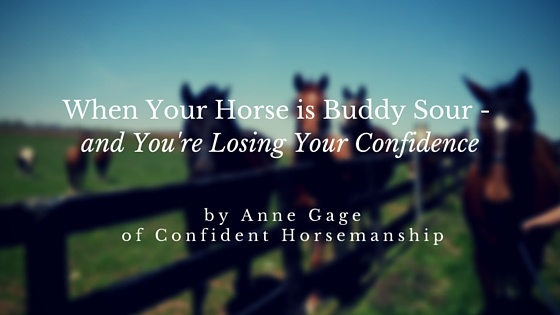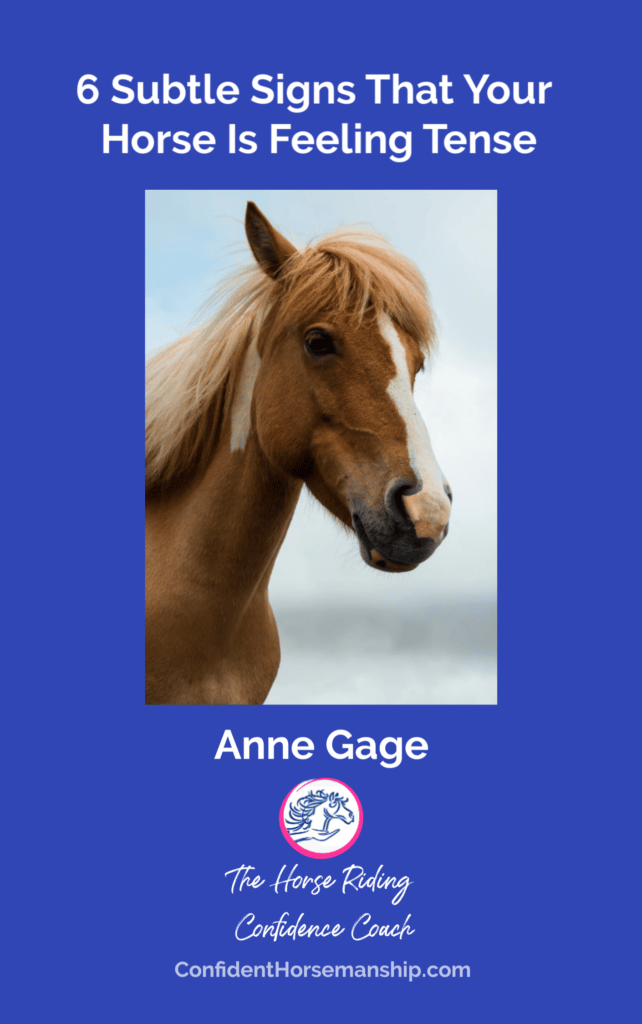
You dream of riding off into the sunset on your lovely horse. One problem - your trusty steed hates to be on her own. Whether you're bringing her in from the paddock, she's alone in the barn, or her best friend is taken away, her behaviour is upsetting, scary or even dangerous.
And her behaviour is making you feel anxious, too. Your losing your confidence. And neither you or your horse are enjoying your time together. What a nightmare! Read on for my tips on how to change your horse from sour to sweet.
What does it mean when a horse is barn sour or buddy sour?
First, it's important to understand what being Barn Sour or Buddy Sour actually is. It's behaviour that is known by many names in the horse world...
- Buddy Sour
- Barn Sour
- Herd Bound
- Separation Anxiety
Whichever term you use, it refers to a horse that really doesn't want to leave the barn, yard or paddock. He may behave in ways that are annoying - frantically call to the other horses, planting his feet and refusing to move, or trying to turn back. Or he may behave in ways that can be dangerous - rearing, bucking, or bolting. On the trail, he will most likely rush as soon as you head back towards home.
What causes horses to be buddy sour?
A combination of instinct and previous experience contributes to horses being barn sour or buddy sour. Because horses are herd and prey animals, they instinctively want to be with at least one other horse. The herd provides not only companionship, but also safety.
In the wild, a lone horse is more vulnerable to predators.
Horses have strong social bonds with their companions. So, being separated, even for short periods of time, can cause them to feel fearful, anxious and stressed.
Previous experience also contributes to horses being buddy sour.
- Weaning done abruptly or too soon can cause a horse to feel insecure and lack confidence.
- Fast and/or force based training creates fear and decreased confidence
- Inadequate training that does not give the horse a solid physical and mental foundation for the work it is asked to do
- Experiences that cause physical discomfort or pain such as poor fitting saddle, harsh bits, inexperienced or rough handling, etc.
Signs your horse is buddy sour
When horses are separated from their herd or kept in isolation for even a short period of time, they may have some of these common signs of separation anxiety:
- Calling out: Loudly and constantly vocalising and calling out to contact their companions.
- Shaking or trembling: Shaking or trembling while being ridden, led or even while just standing.
- Sweating/ increased heart rate: Increased heart rate or increased sweating that is abnormal for the amount of work the horse is doing at the time.
- Not eating or drinking: Highly stressed horses are unwilling to eat - even special treats - or drink
- Rearing/ Kicking out/ Bucking: Highly stressed horses who are unable to run away (flight) may resort to behaviours like striking out with their front legs or kicking out with their back legs. This "fight" (defensive) behaviour can also escalate to more dangerous behaviours like bucking and rearing.
- Spooking or bolting: Anxious horses are more reactive and have a tendency to spook and/or bolt (run off). This is a flight response to fear. Both spooking and bolting may happen while being ridden or led.
- Pacing/ Fence Walking: Another flight response in horses is anxiously pacing, walking or even running fences when separated from or unable to make physical/ visual contact with their companions.
- Weaving and stall walking: Another flight/fear response in horses is weaving. The horse walks from side to side or sways in one spot. He may walk around in circles rather than sway side-to-side.
- Pawing: When movement is restricted or restrained, horses may take to pawing (digging at the ground) when being ridden, stabled or tied.
How To Help Your Barn Sour Horse
It is possible to help your buddy sour, herd bound horse to become happy, confident and a joy to be around.
Some people suggest isolating your horse until they stop exhibiting the unwanted behaviours. DO NOT DO THIS! You will either make the separation anxiety worse or the horse will go into learned helplessness (shut down).
It takes time and patience to retrain your barn sour horse - there is no quick fix to this problem. You need to help your horse to feel safe, comfortable and confident with being away from other horses
It takes a systematic approach that gradually expands your horse's comfort zone while reinforcing positive association with being alone without sending her into a panic.
Now this part is very important ... Behaviours that get reinforced get stronger.
So, if your horse is stressed out every time she leaves her buddies (and she just happens to be with you when that happens) that's the behaviour that is being reinforced. Leaving her buddies is always going to be a negative and stressful experience.
Find Your Barn Sour Horse's Comfort Zone
But, if you figure out how far from her buddies your horse can be while remaining calm and comfortable, that's where you start. You've identified her comfort zone.
That may be just on the other side of the paddock fence. So be it. That's where you start.
You walk her a few feet away from that space and watch carefully to see when the tension starts. Then you take her back to her comfort zone until she settles down.
Do things she enjoys while you're working with her.
- Groom her.
- Scratch her favourite places.
- Feed her – give the morning and evening grain or a special treat like carrots or apples.
Make the time with your buddy sour horse something really special and enjoyable for her.
Stay On The Right Side Of Your Horse's Fear Threshold
By the way, if your buddy sour horse won't eat, you've gone too far beyond her comfort zone. She's gone over her fear threshold. She's not able to think. She's panicking and she's operating completely from instinct.
Take her back to where she's comfortable and allow her to calm down.
If she's just a little bit stressed, but will eat calmly you're in the right place. (Click here to download my free infographic - 6 Subtle Signs of Tension)
Start with very short sessions (5-10 minutes max) with the focus on giving your horse a good experience.
Slowly Expand Your Buddy Sour Horse's Comfort Zone
As your horse gets more comfortable being outside of the paddock you can extend the distance (gradually, again) and/or lengthen the time she's separated from her buddies.
You could lead or ride her around the perimeter of the paddock. If it's a safe area without any potential hazards to you or her.
You can lead or ride her down your driveway – if it's not too far from the paddock. And she stays under her fear threshold.
Always watch for signs of tension. When you see any, take her back to her comfort zone to calm down.
Remember your purpose is to give her good experiences while she's with you and away from her buddies.
So take things slowly and gradually expand the area and the time you are taking her away.
How Long Does It Take to Stop Being Buddy Sour?
What I can't tell you is how long this process will take. Horses are as individual as people are.
What I can tell you is that consistency and repetition do affect the outcome and how the length of time it takes to effect a behavioural change.
So, work with your horse as often as you can. Keep the sessions short – a few good minutes repeated a couple of times a day or 3 times a week will be much more beneficial than an hour once a week.
Remember that your "buddy sour" horse is suffering from genuine fear and lack of confidence. She doesn't enjoy or want to feel this way any more than you do.
She's not "buddy sour" or "barn sour". She's not being a brat. Or trying to get out of working.
She is feeling anxious. Because she's scared for her life. That's her perception of the situation.
When you
- understand your horse's perspective and
- can help her have good experiences when she's with you
- use this systematic training method
- she will start to feel more comfortable and safer with you.
And in the end, you and your horse will have a much stronger bond.
GET INSTANT ACCESS to my FREE InfoGraphic
6 Subtle Signs That Your Horse Is Feeling Tense
- Recognize subtle signals that your horse gives when he's feeling even a little bit stressed: You'll be able to prevent those unexpected spooks that seem to come out of nowhere.
- Improve your communication with your horse: You'll understand why your horse behaves the way he does. And you can take proactive steps to help him feel more calm ... And prevent those unwanted behaviours.
- Develop a deeper connection with your horse: When you recognize that your horse feels tense then you can take steps to help him relax and feel safe. That builds his trust in you.

